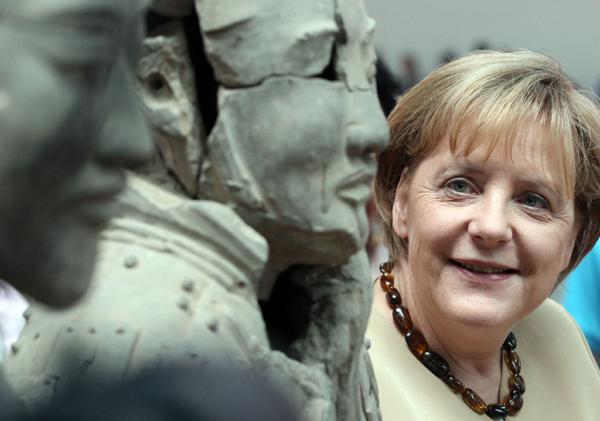
German Chancellor Angela Merkel marvels at the terracotta warriors on Saturday in Xi'an, capital of Shaanxi province. She celebrated her 56th birthday in the city, where she received a taste of traditional Chinese hospitality and culture. [Wu Zhiyi / China Daily]
XI'AN - Premier Wen Jiabao reassured foreign business leaders on Saturday that China's investment climate was stable and said Beijing would not block the export of rare metals needed to manufacture computers and mobile phones.He made the comments while meeting German Chancellor Angela Merkel and business leaders from the two countries in Xi'an, capital of Northwest China's Shaanxi province.
"There is an allegation that China's investment environment is worsening. I think it is untrue," Wen said in response to a question from Juergen Hambrecht, chief executive of the German chemical company BASF.
The World Bank gave China a low investment environment ranking in a July report.
Wen said foreign investment does not pour into a country where the investment environment is deteriorating, citing Ministry of Commerce data that showed foreign investment in China in the first half of 2010 rose 19.6 percent year on year.
Wen said China welcomes investment from companies that meet its industry policies. The government will ensure such companies have access to the Chinese market, he added.
"Those that have entered China all enjoy national treatment, as do Chinese companies, whether they are a foreign-funded company, a joint venture or a joint stock company," Wen said.
The premier also promised China would never block the export of rare earth minerals, but said the minerals should be exported for a reasonable price and at a reasonable volume.
China supplies about 90 percent of the world's rare earth minerals.
The meeting came after China and Germany signed 10 agreements in Beijing on Friday. The deals involved green energy, culture and a joint venture to manufacture trucks.
The two sides also signed a joint declaration on the establishment of an environmental partnership involving water resource protection, equipment safety and evaluation, energy conservation, renewable energy and technology.
Both Wen and Merkel agreed bilateral ties are at a new starting point.
"Sino-German cooperation has proven that a developed nation could conduct cooperation in a comprehensive way with a large developing nation and the key is to enhance mutual trust," Wen said.
Merkel said her trip, focused on establishing a stronger foothold for German businesses, had been a great success.
Merkel's visit indicated another honeymoon between the two countries, experts said. Tensions escalated in recent years due to Merkel's criticism of China's human rights record and her meeting with the Dalai Lama.
Bilateral ties have gradually improved through both countries' efforts. Germany is China's top trading partner in the European Union. China's trade with Germany is equal to its combined trade with Britain, France and Italy.
According to analysts, Sino-German relations have passed the test of the global financial crisis. Dealing with China in the post-crisis era is important not only to Germany, but to the whole of Europe.
Renmin University professor Jin Chanrong said Merkel's visit will assist the development of mutual trust and stable ties. It will also help her cement her leadership role, he said.
Xinhua and AP contributed to this story.





